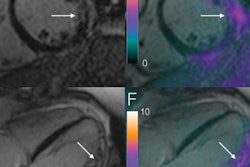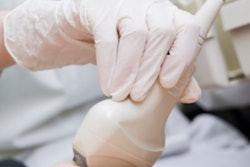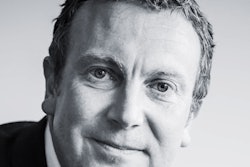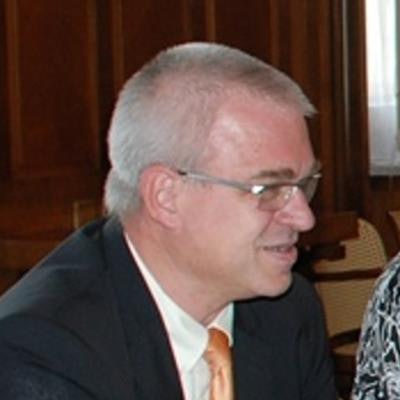
After a two-year spell working as deputy minister of health in the Czech Republic, radiologist Dr. Josef Vymazal, PhD, advises medical doctors with political aspirations to proceed with extreme caution and be prepared for setbacks. In this question-and-answer interview, he reflects on his time in office.
Vymazal has now returned to his clinical role as professor in the department of radiology at Na Homolce Hospital in Prague. Since 2008, he has been a professor of radiology at Charles University in Prague, having previously been an associate professor of neurology at the same institution. He is a board member of the Czech Society for Neuroradiology and the neuro section editor for Czech Radiology. He is a member of the editorial board for Czech and Slovak Neurology and Neurosurgery and the journal Neuroradiology. He was a founding member of AuntMinnieEurope.com's editorial advisory board.
AuntMinnieEurope.com: Did you have any previous experience of political office?
Vymazal: No, I did not have any experience in political office or in political life at all, and have never been a member of any political party. In October 2013, there was a new political movement, the ANO [see note at end of article], that received a high percentage of the vote in the parliamentary elections. As this movement endeavored to do things differently, I was nominated as a professional and offered a deputy minister position with the ability to do things my own way. It was a big challenge that I could not resist.
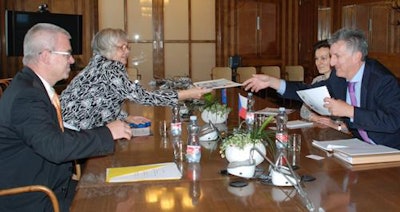 Vymazal (left) learned a great deal from the two years of political meetings, interactions, and discussions. Images courtesy of Lenka Blažková, Ministry of Health, Czech Republic.
Vymazal (left) learned a great deal from the two years of political meetings, interactions, and discussions. Images courtesy of Lenka Blažková, Ministry of Health, Czech Republic.What do you regard as your main policy successes?
Some important amendments that I prepared with my team were passed, which I consider a big success. Notably, a law about postgraduate education for physicians, and also a law that registered nurses do not require university education. Young physicians have been leaving our country partially due to the very complicated postgraduate education system. The amendment of the given act should make the process easier, with young physicians able to spend most of their time in their workplace, rather than spending unnecessary time at university clinics.
Regarding the amendment on nursing education, I am deeply convinced that university education is not necessary for all nurses. I fully support education for nurses, technicians, and other medical personnel, however, I am against compulsory university education for all nurses.
And did you have any failures or frustrations?
My main frustration was based on the fact the political world is completely different from the medical or academic worlds. The rules are different, the values are different, and the relationships are also different and often superficial. Hypocrisy is something that I encountered on a daily basis. It was very difficult for me to get used to the political world.
The fact that I was a deputy minister nominated by a different party to that of the minister made the situation even more difficult. The relations between these two coalition parties were never good, and at the time, were getting worse. Of course this situation influenced my position at the Ministry of Health.
Overall, how did you find the whole experience? Was the work more challenging than you expected? In what ways was it different/similar to clinical practice?
In life I regret the things I do not do and not what I have done. It was an experience that is very difficult to share. However, I learned to see medicine as a whole and not only from the perspective of my own medical field. I learned how the legislative process works and I also met some very interesting people, both in my own country and abroad.
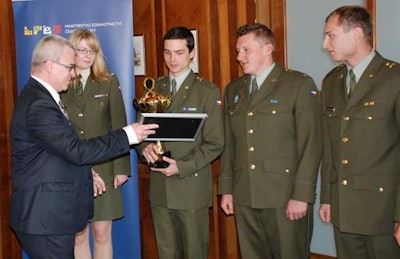 Official presentations were an enjoyable part of Vymazal's political work.
Official presentations were an enjoyable part of Vymazal's political work.What practical advice and suggestions do you have for radiologists and other medical doctors who are keen to enter political office?
Be prepared to enter a world with different values, rules, and processes. You will feel a different kind of stress. This is probably one of the reasons why some academics have failed as politicians. Do not expect that you will be able to make big changes in a short time, especially if you do not have strong political support. Do not fight alone.
What does it feel like to return to your clinical role? Would you say you've become a better doctor?
I kept some of my clinical practice therefore my return to clinical medicine was not difficult. I came back to an environment where I feel at home and the stress in clinical medicine is something I got used to many years ago.
I have learned to see medicine from a broader perspective. I do not know if I have become a better doctor, but I definitely feel more satisfied with my clinical work than before.
Editor's note: ANO 2011 is a centrist, populist movement in the Czech Republic founded by Andrej Babiš, who is reportedly the second wealthiest person in the country. The movement is based on the former Action of Dissatisfied Citizens (Czech: Akce Nespokojených Občanů, ANO).





